This year, as we commemorate the 75th anniversary of the Geneva Conventions, we reflect on the shared legacy of the ICRC and Somalia—a partnership built on resilience and compassion. Today, with over 300 dedicated staff across 12 offices, the ICRC continues its mission to alleviate suffering in armed conflict, responding to both immediate crises and long-term needs throughout Somalia.
This photo exhibit traces the ICRC’s history in Somalia, beginning with its first recorded operations during World War II in 1942 and leading up to its intensive humanitarian work today. They depict both challenging and hopeful moments in Somalia’s history, as the ICRC has stood alongside communities through conflict and natural disasters. From assisting war victims to providing vital support during severe droughts, including the 2011 famine, the ICRC’s commitment to promoting humanity and the rules of war continues to bring hope to millions in Somalia.
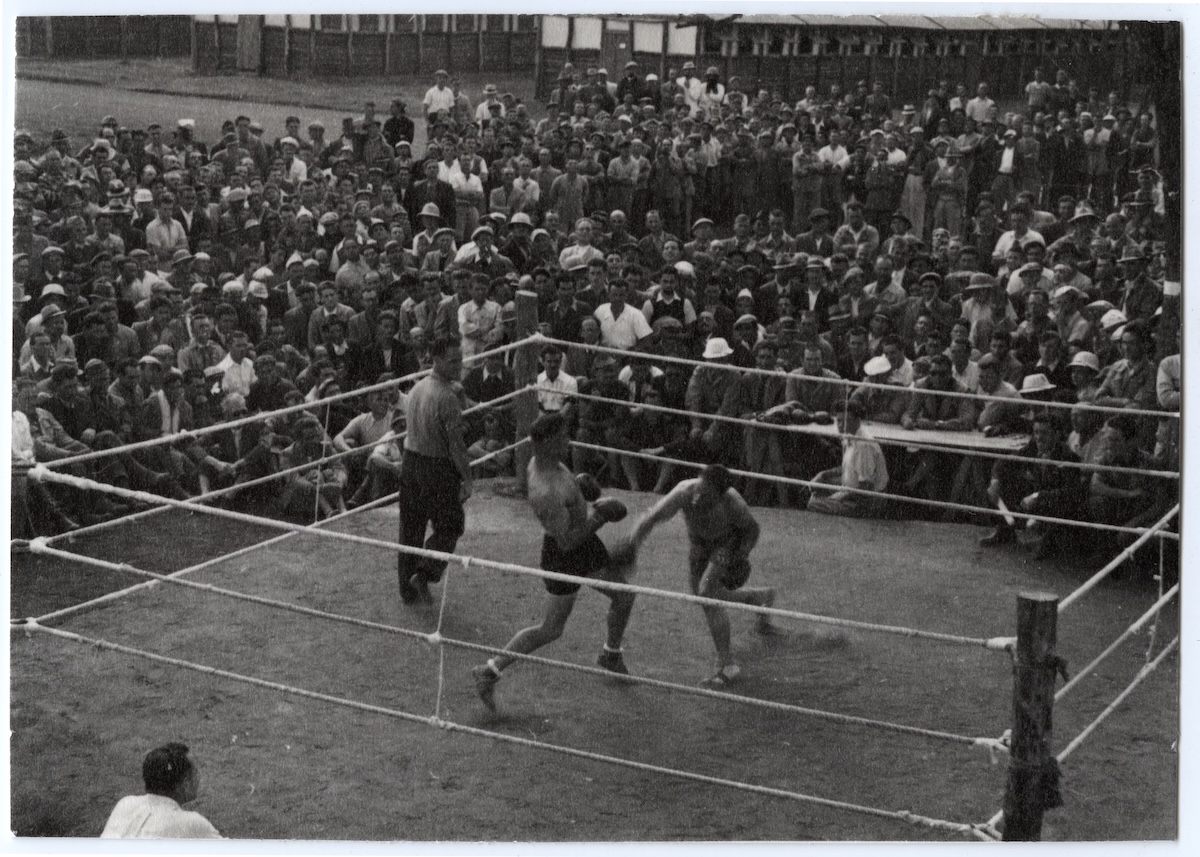
1942
Photographer: Russbach, Rémi
First ICRC Operations
The ICRC’s history in Somalia began in 1942, during World War II, when the organization supported Italian prisoners of war and civilians displaced by the conflict. This photograph reflects a slice of Somalia’s complex colonial legacy capturing a boxing match between Italians in an evacuation camp for civilians in Mogadishu. Italian influence remains visible in Somali life today, from the Italian language still spoken by some Somalis to a shared culinary love for pasta and other dishes that have become local staples. The photo is a reminder of Mogadishu’s layered past and the enduring cultural traces that shape its present.
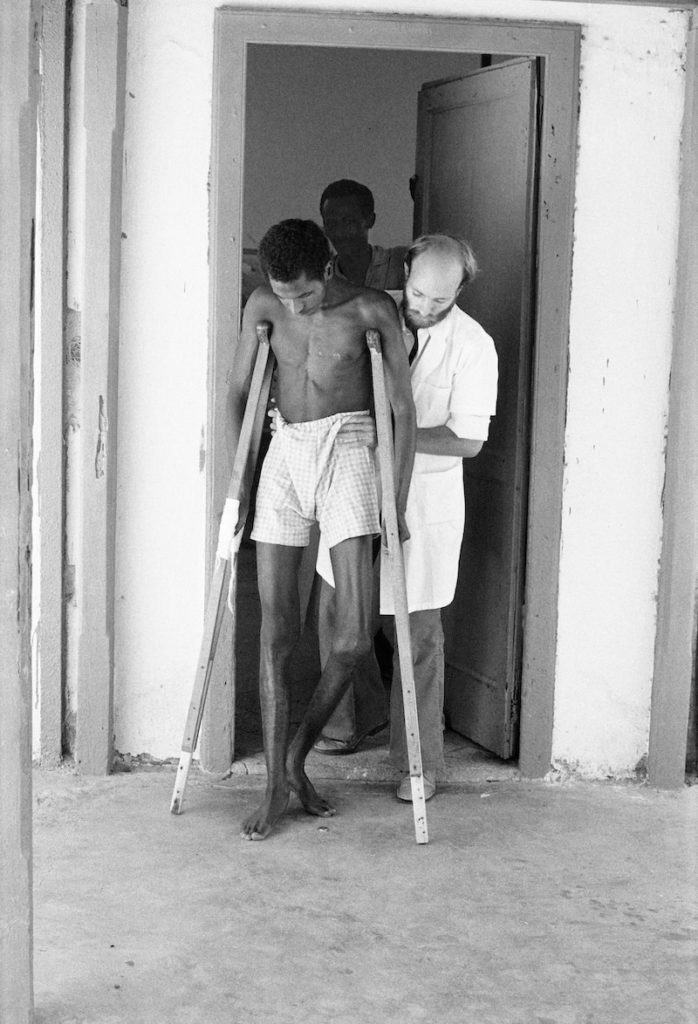
1979
Photographer: Russbach, Rémi
A Lifeline for Victims
In the aftermath of the Ogaden War (1977 – 1978), the ICRC set up a rehabilitation centre in Somalia to help provide medical care and physical therapy to those affected. The centre provided a lifeline for thousands injured in the war.
Today, the ICRC supports three physical rehabilitation centres run by Somali Red Crescent Society (SRCS) locally referred to as Bisha Cas in Mogadishu, Hargeisa, and Gaalkacyo. In 2023, these centres saw over 38,450 people for physiotherapy sessions.
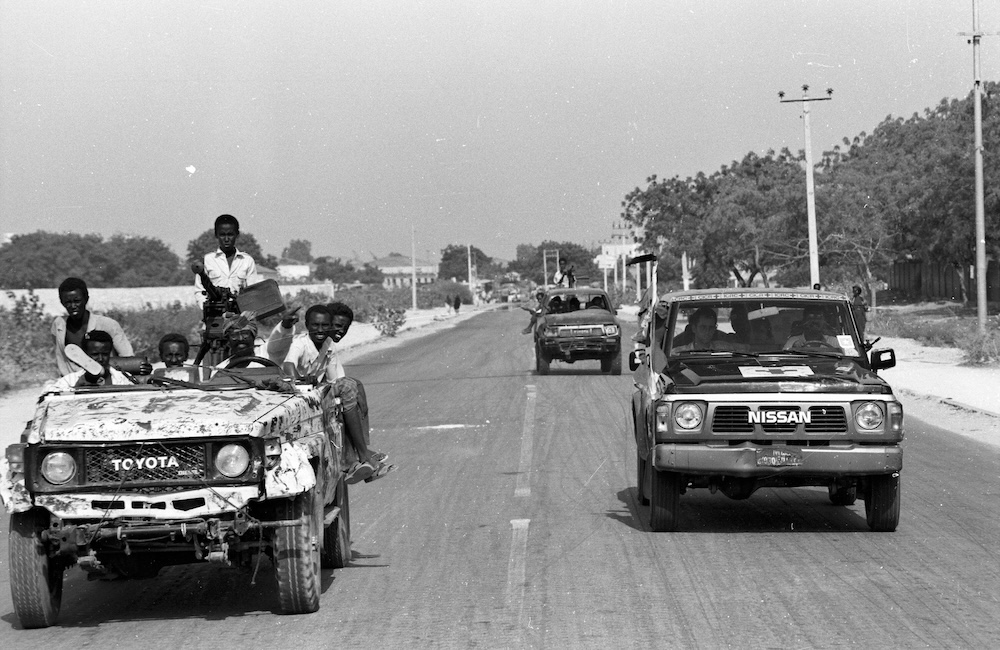
1991
Photographer: SURY, FRANÇOIS DE
Civil Strife
The collapse of the Siad Barre regime in 1991 led to a power vacuum and devastating waves of violence throughout Somalia. In the face of constant danger, the ICRC continued to deliver lifesaving assistance to families trapped in conflict zones across the country. This photograph shows an ICRC vehicle on a road in Mogadishu, surrounded by other vehicles with armed combatants—a reminder of the immense challenges that the ICRC has navigated to reach those in need. Security concerns remain paramount, and, unlike in most other countries, the ICRC in some situations uses armed escorts in Somalia, reflecting the extreme complexities of working in this environment.
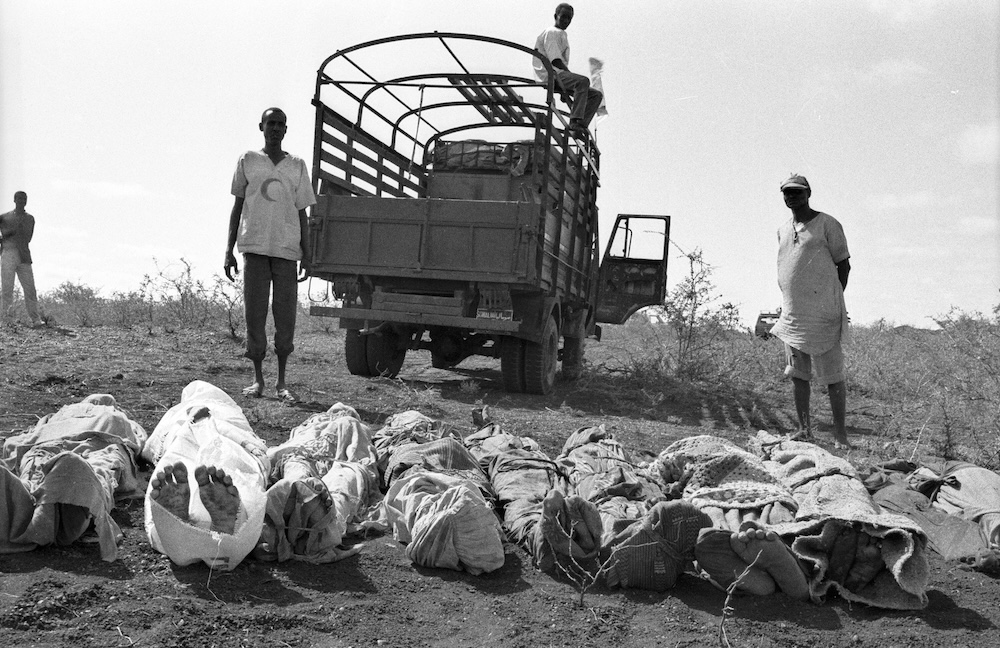
1992
Photographer: Winquist, Nina
Dignity Amidst Carnage
The civil war brought devastating violence, with thousands of casualties and millions displaced, leaving countless families in dire need of assistance. Ensuring a dignified management of the dead has been a cornerstone of the ICRC’s work in Somalia, as respectful handling of human remains reduces the possibility of people going missing and profoundly impacts the mental well-being of survivors and the community. The ICRC continues to train first responders, medical personnel, and weapon bearers across Somalia in the Management of Human Remains, promoting practices that honor those lost and support healing for the living. Last year, the ICRC provided critical support in the recovery and identification of those killed during the armed conflict in Las Anod.
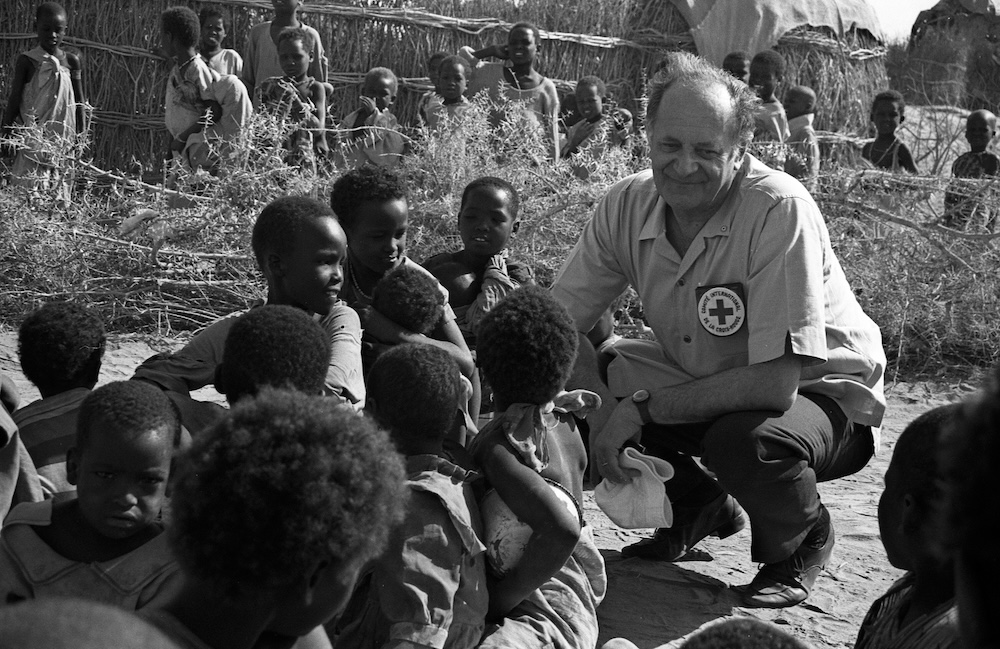
1993
Photographer: Boussel, Pierre
A Visit During Crisis
Amid the escalating civil war and deepening humanitarian crisis in Somalia, ICRC President Cornelio Sommaruga visited the country to witness firsthand the struggles of Somali families. Serving as ICRC President from 1987 to 1999, Sommaruga was recognized for his unwavering dedication to humanitarian principles. His visit underscored the Red Cross’s commitment to millions of Somalis in urgent need of support.
Notably, Sommaruga’s visit coincided with the “Black Hawk Down” incident of 1993, during which a U.S. military helicopter was downed, resulting in the capture of pilot Mike Durant by armed groups. The ICRC visited Durant during his 11 days in captivity—a stark example of the organization’s unique humanitarian role, even in extreme conflict situations. This period has been immortalized in Mark Bowden’s writings and the subsequent film adaptation by Ridley Scott, highlighting the intense and complex challenges that marked the era.
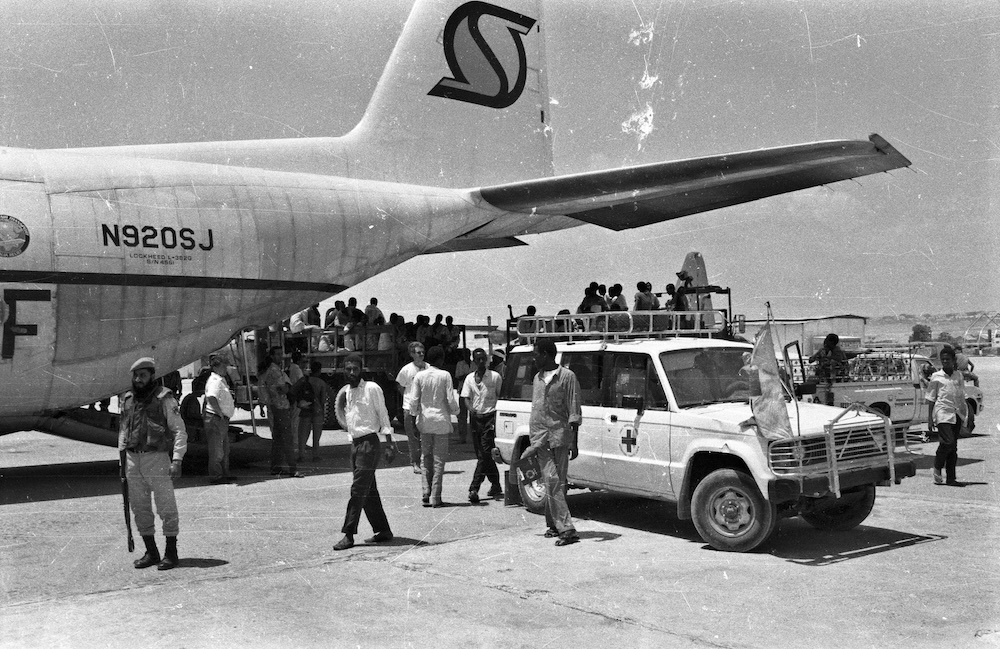
1993
Photographer: Bigler, Roland
Heading Home
As a neutral intermediary, the ICRC has long facilitated the release and repatriation of prisoners of war and detainees in Somalia. This role was crucial during the repatriation of POWs from the Ogaden War in 1988, the release of detainees during the civil war, and the 2019 simultaneous release of detainees by Puntland and Somaliland. Last year, the ICRC facilitated the transport of two released weapon-wounded detainees from Las Anod to their families in Hargeisa.
This photograph captures a moment in Mogadishu, where ex-detainees, freshly released, receive blankets, clothing, and soap from Somali Red Crescent Society volunteers before boarding an ICRC-chartered plane to return home.
“When the prisoners of war finally saw the plane, and they went up, that’s when the excitement got a little bit contagious. It was just something you couldn’t envision—people, held captive in another country, suddenly getting the chance to go home. They walked down the gangplank of the plane, and they kissed the ground,” a former ICRC nurse Judy Owen noted of her experience during the release.
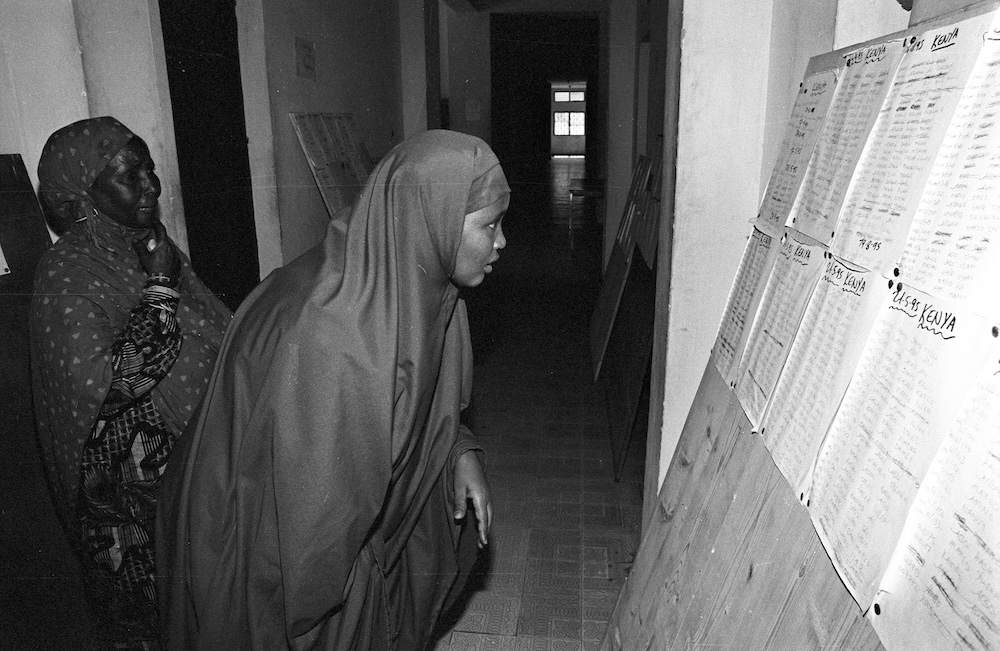
1995
Photographer: Nosten, Anne
Voices of the Missing
In this photograph, a woman checks a list of people with Red Cross Messages (RCMs) waiting for them in Mogadishu. The RCM service was a lifeline for families separated by conflict, offering a way to communicate when conventional postal and telephone networks were disrupted. In the chaotic aftermath of civil war, the names of those who had received messages from family members were posted on walls, thanks to the collaborative efforts of the ICRC and the Somali Red Crescent Society (SRCS). This project became a beacon of hope, allowing families to know the fate of missing loved ones.
The ICRC also partnered with BBC Somalia to broadcast names of missing persons through the Baafinta project, a program that ran for decades, offering solace to countless families. Today, the ICRC and SRCS continue these vital efforts, helping families reconnect despite the ongoing challenges. In 2023 alone, over 90,000 Red Cross Messages were exchanged, and more than 160,000 free calls were provided to families.
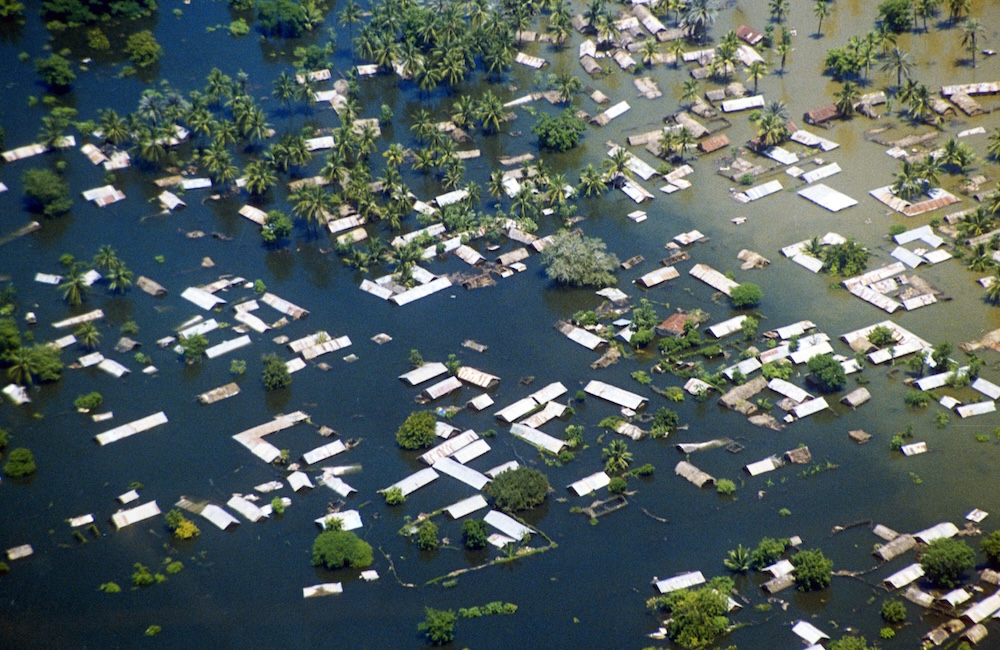
1997
Photographer: Anselmo, Josuè
El Niño Devastation
An aerial view of a flooded village in Juba. The 1997 El Niño brought devastating floods to Somalia’s Juba Valley, submerging homes, drowning livestock, and destroying crops. Thousands of people were displaced, compounding the already fragile humanitarian landscape in the aftermath of civil war. These extreme climate events have only grown more frequent, with Somali families caught between the compounded effects of severe weather and ongoing conflict, making recovery increasingly difficult.
In 2023, following one of Somalia’s worst droughts in history, the country was struck again by catastrophic El Niño flooding, which affected 2.5 million people, displaced 1.2 million, and claimed 119 lives. The ICRC remains committed to supporting families through such crises, providing emergency cash and food assistance to help them adapt to sudden and often severe changes in their circumstances.
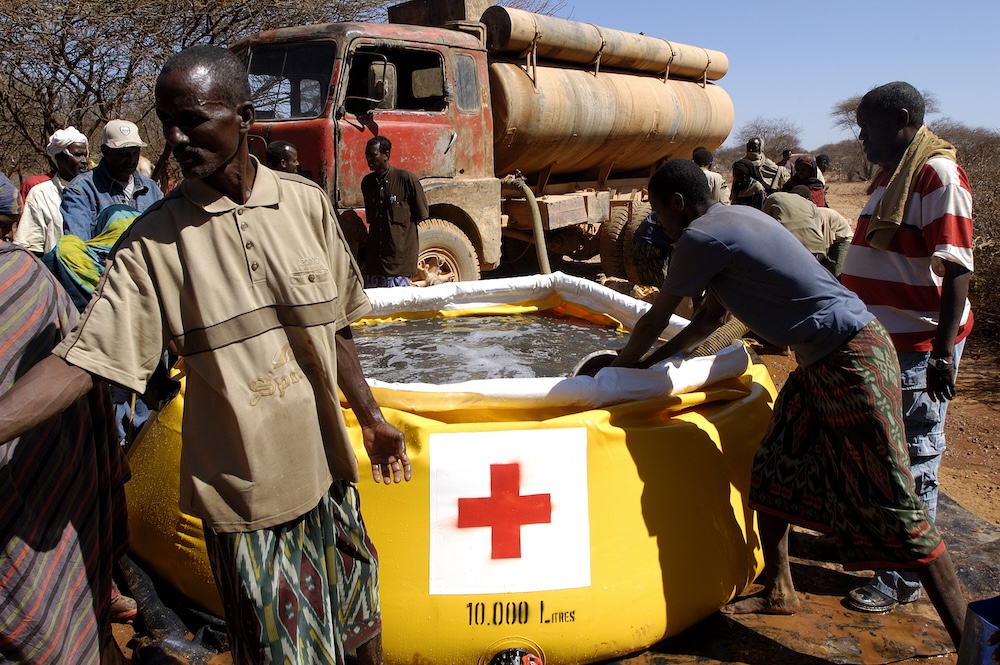
2006
Photographer: Yazdi, Pedram
Ravaging Drought
In 2006, Somalia faced a severe drought, with temperatures soaring to 50°C, making survival exceedingly difficult for both people and their livestock. In response, the ICRC intensified efforts to improve water access for affected communities, repairing dozens of boreholes, wells, and rainwater catchments. Water trucking became essential, with water sourced from boreholes in areas like Wajid, Bakool region, and transported to those in need. This photograph captures one of these trucks filling an onion tank to deliver much-needed water to communities in Bakool.
Securing clean water for communities impacted by armed conflict and climate crises remains central to the ICRC’s mission in Somalia. In 2023, more than 400,000 people accessed safe drinking water through 52 water supply points built or rehabilitated by the ICRC, in a bid to help communities endure and rebuild.
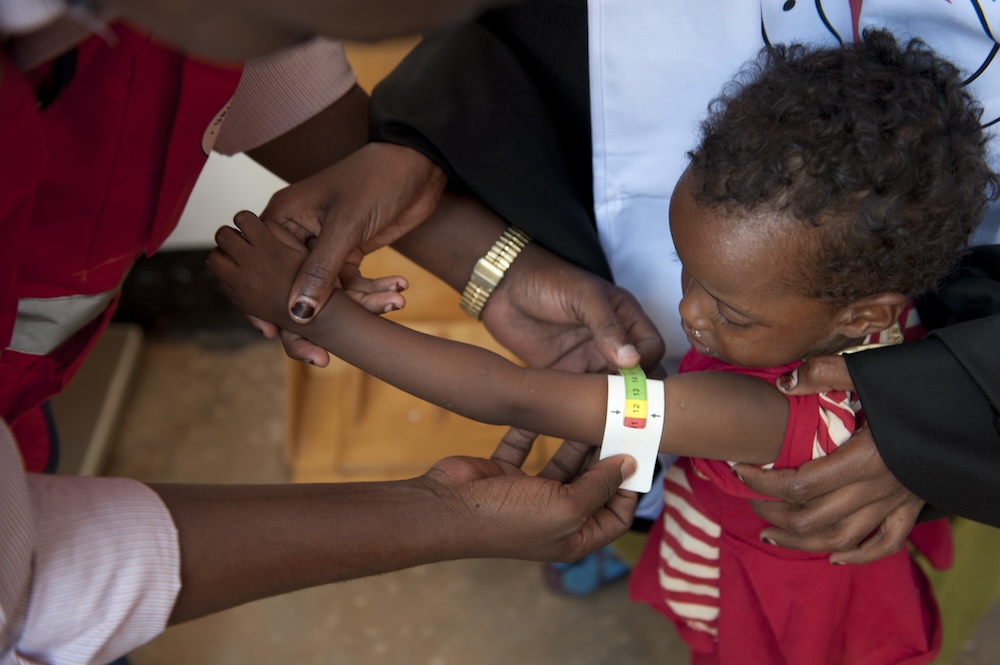
2011
Photographer: Saltbones, Olav A.
A Nation Starved
In 2011, Somalia was gripped by a devastating famine, with children suffering the most, as malnutrition rates soared. Years of drought and conflict had drained communities of resources, leaving thousands of children acutely vulnerable to starvation. Today, the combined effects of climate change and armed conflict continue to strain families’ ability to put food on the table, driving persistent malnutrition.
There is, however, a glimmer of hope: the ICRC operates a stabilization center in Kismayo and for many years supported a similar facility Baidoa. Both centres continue to provide lifesaving support for children under five suffering from severe malnutrition and related complications. Additionally, the ICRC supports 16 SRCS clinics offering nutritional care for mothers and children across Somalia. In 2023, these clinics served over 40,000 children and 14,000 pregnant and lactating women, supplying them with essential food supplements to combat malnutrition. The picture, taken in 2011, shows a nurse taking a mid-upper arm circumference (MUAC) measurement of a child at an SRCS run clinic in Harfo, Mudug Region.
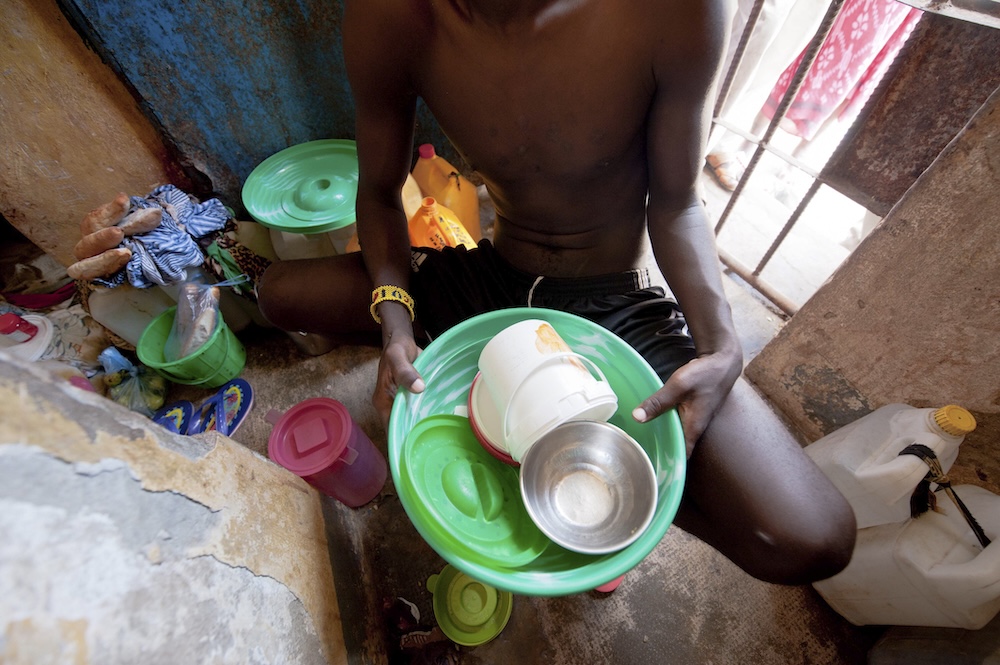
2015
Photographer: Yazdi, Pedram
Dignity in Detention
Visits to people deprived of their liberty have long been central to the ICRC’s mission. The ICRC’s first detention visits took place during WWI (1914-1918), when delegates visited Western Romanian and Serbian prisoners of war. Since then, the organization has supported detainees worldwide—from thousands of prisoners during the World Wars to Nelson Mandela during his imprisonment.
In Somalia, the ICRC has a 38-year history of visiting detainees, beginning with prisoners during the Ogaden conflict from 1977 to 1988, and, since 2012, supporting detainees in central prisons, police stations, and state security facilities. Today, the ICRC regularly visits 15 detention facilities across Somalia, working to ensure that detainees are treated humanely and with dignity. The organization also promotes family contact, enabling families to stay informed of their loved ones’ fates and visit them when possible. During Ramadan, the ICRC’s food distributions have become an annual tradition, allowing detainees to observe the holy month with dignity. Photo shows a detainee in Mogadishu Central Prison.
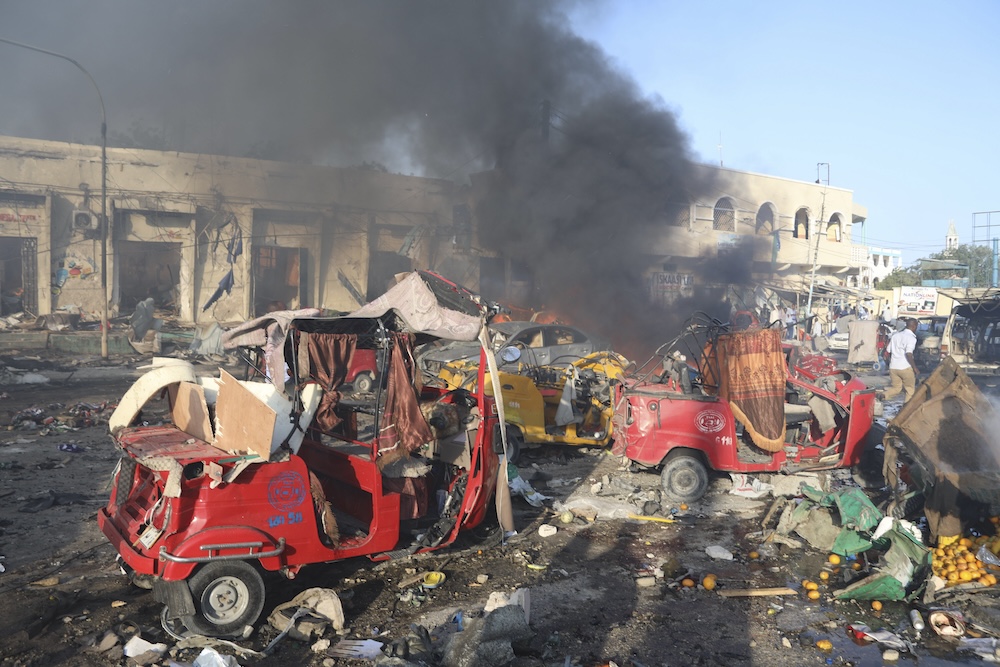
2017:
Photographer: Omar, Feisal
October 14
A truck bombing at a busy intersection in Mogadishu, claimed the lives of more than 500 people, including four SRCS volunteers. The scars of the attack are still seen and felt in the Somali capital. Today the intersection, formerly Zoobe junction, is known as the October 14 junction, and a monument marks the spot where the bomb blew apart buildings and ended so many lives.
In the aftermath of the incident, ICRC in collaboration with SRCS were quick to respond, offering onsite first aid, ambulance services, donation of medical kits and body bags to hospitals in the country. ICRC-supported Medina and Keysaney hospitals in Mogadishu were among the medical facilities that treated the wounded.
The ICRC continues to support the hospitals and their surgical capacity with training and medical supplies. It also supports the SRCS ambulance teams in Mogadishu, Galkacyo and Las Anod through its First Aid and Pre-Hospital Emergency Care programme. In 2023, more than 2,000 patients with weapon wounds were treated in ICRC-supported hospitals, some of whom were transported to the facilities by SRCS ambulance teams.
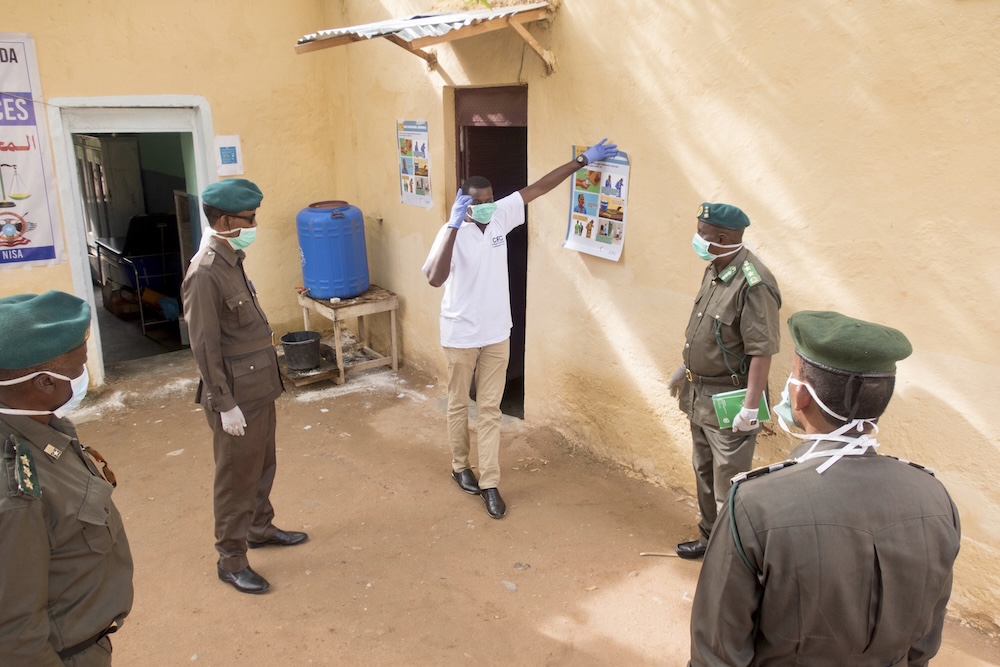
2020
Photographer: Taaxta, Ismail
A Pandemic Hits
When COVID-19 struck, Somalia—already grappling with healthcare challenges due to conflict and climate change—faced new layers of uncertainty. The ICRC, in collaboration with hospitals and SRCS clinics, worked swiftly to implement preventive measures, distributing hygiene supplies on a large scale to help curb the spread of the virus across communities.
To support detainees, hygiene kits were provided to 24 places of detention, including central prisons in Mogadishu, Kismayo, Baidoa, Garowe, and Hargeisa. Prison staff in these facilities received training on COVID-19 prevention, equipping them with knowledge to protect both staff and detainees. This photograph shows Baidoa Central Prison, where authorities were briefed on essential health measures to mitigate the impact of the pandemic within detention settings, ensuring the health and safety of some of the country’s most vulnerable.
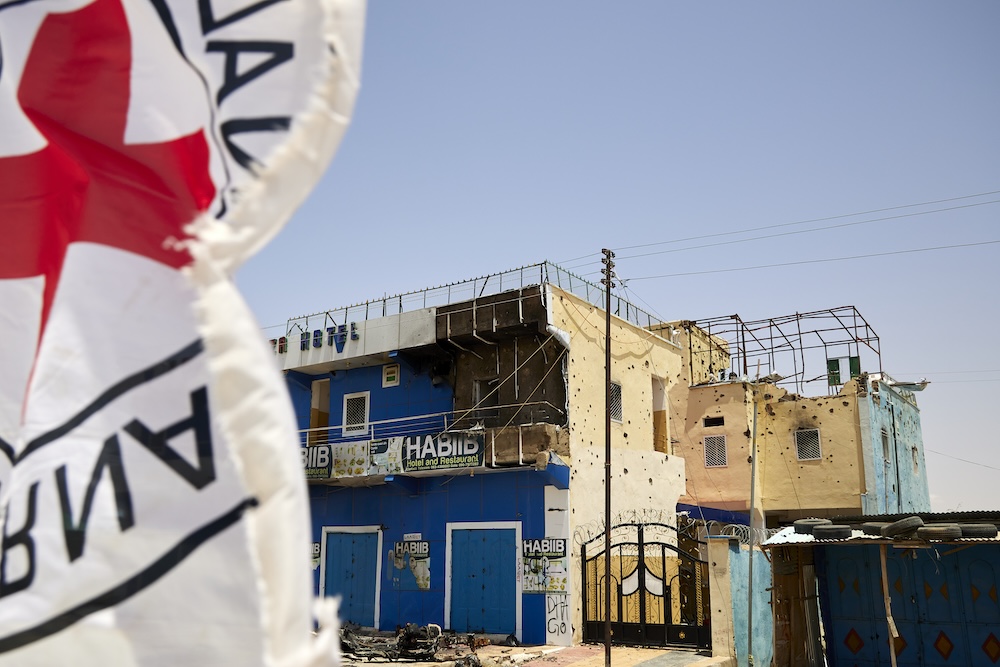
2023:
Photographer: Mohamed, Abdikarim
Fighting in Las Anod
An outbreak of fierce fighting in Las Anod last year left over 150 people dead and displaced hundreds of thousands. As violence surged, Somali Red Crescent Society (SRCS) ambulance teams reported a threefold increase in patients with weapon injuries compared to the previous year. In response, the ICRC quickly dispatched surgical supplies to six hospitals in Las Anod and nearby areas, providing enough materials to treat over 400 wounded individuals.
As the first humanitarian organization to access Las Anod, the ICRC’s neutral and impartial approach enabled it to provide critical aid in this volatile setting. International humanitarian law (IHL) underscores the importance of unimpeded access for humanitarian actors to assist those affected by conflict. Today, the ICRC continues to support families in Las Anod, addressing urgent humanitarian needs and visiting detainees in both Hargeisa and Las Anod, embodying its commitment to protect and assist all those impacted by armed conflict.

